1st Parachute Hussar Regiment
The 1st Parachute Hussar Regiment (French: 1er Régiment de Hussards Parachutistes, 1er RHP) is an airborne cavalry unit in the French Army, founded in 1720 by Hungarian noble Ladislas Ignace de Bercheny. It is stationed in Tarbes and is a part of the 11th Parachute Brigade.
| 1st Parachute Hussar Regiment | |
|---|---|
| 1e Régiment de Hussards Parachutistes | |
 Regimental Insignia of the 1er RHP | |
| Active | 1720 – 1815 1816 – 1928 1928 – 1940 1945 – present |
| Country | France |
| Branch | French Army |
| Type | Airborne Cavalry |
| Part of | 11th Parachute Brigade 3rd Division |
| Garrison/HQ | Tarbes |
| Nickname(s) | Bercheny |
| Patron | St Michel, St Georges |
| Motto(s) | "Omnia si perdas, famam servare memento" "Si tu as tout perdu, souviens-toi qu'il reste l'honneur" (Fr) |
| Colors | Red and blue |
| Equipment | see Equipment |
| Engagements | War of the Polish Succession War of the Austrian Succession |
| Decorations | see Decorations |
| Battle honours | see Battle Honours |
| Commanders | |
| Current commander | Colonel De Montgros |
| Abbreviation | 1e RHP |

Creation and different nominations

- 1719 - 1720 : The Hussars of Bercheny are raised at Constantinople, following the demand of the Regent Philippe I, Duke of Orléans by Count of Bercheny.
- 1791 : Units of the French Army are named after their function of arms and numbered in terms of their seniority. The Regiment of Bercheny becomes accordingly the 1st Hussar Regiment.
- 29 floréal an IV ( 29 - floréal: meaning the second month of spring - an IV or year IV : end of 1795 and debut of 1796 in the Gregorian calendar) : The regiment received half of the cavalry of the 13th Hussar Regiment (French: 13e régiment de hussards).
- 1815 : The regiment is dissolved.
- 1816 : Creation of the 1st Hussar Regiment of Jura.
- 1824 : Redesignated as 1st Hussar Regiment of Chartres.
- 1940 : dissolved following the Armistice with Germany.
- 1945 : recreated by the political resistance during World War II and designated Reconnaissance Regiment of the 25th Division.
- 1946 : designated as 1st Parachute Hussar Regiment at the corps of the 25th Airborne Division 25e D.A.P on the occasion of the regiment's voyage to Algeria.
History since 1946
Campaigns
|
Campaign Participation Engagement
|
Campaign Participation Engagement
|
Campaign Participation Engagement
|
|
Campaign Participation Engagement
|
Campaign Participation Engagement
|
Campaign Participation Engagement
|
Composition
The 1er RHP consists of:
- Command and Logistics Squadron (ECL)
- 1st Squadron, Air-transportable armored (1er Escadron)
- 2nd Squadron, Air-transportable armored (2e Escadron)
- 13 VBL
- 12 ERC 90 Sagaie
- 3rd Squadron, Reconnaissance and Anti-Tank (ERIAC) (only unit fully parachutable, both men and equipment) (3e Escadron)
- VBL
- VBL reconnaissance, 7.62 mm AA-52 machine gun
- VBL anti-tank, MILAN anti-tank missile
- VBL support, 12.7 mm M2 Browning machine gun
- VBL command
- VBL
- 4th Squadron, Air-transportable armored (4e Escadron)
- 13 VBL
- 12 ERC 90 Sagaie
- 5th Squadron, operational reserve (5e Escadron)
- 11th Squadron, training and education (disbanded on 14 January 2011)
- 2 GCP Teams
Vehicles
- AMX 10 RC (3)
- ERC 90 Sagaie (36)
- Véhicule Blindé Léger (68)
- Peugeot P4 (84)
- Cagiva motorcycles
- Véhicule de l'Avant Blindé
Weapons
- MILAN anti-tank guided missile (24)
Traditions

Except for the Legionnaires of the 1er REG, 2ème REG, 2ème REP that conserve the Green Beret; the remainder of the French army metropolitan and marine paratroopers forming the 11th Parachute Brigade wear the Red Beret.
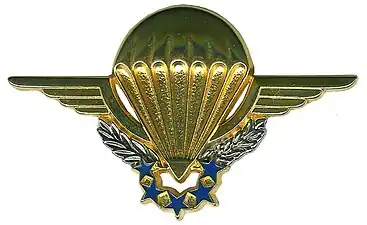
 1er Circled Winged Armed Dextrochere of French Army Metropolitan Paratroopers
1er Circled Winged Armed Dextrochere of French Army Metropolitan Paratroopers
The Archangel Saint Michael, patron of the French paratroopers is celebrated on September 29.
The prière du Para (Prayer of the Paratrooper) was written by André Zirnheld in 1938.
Insignias
Just like the paratrooper Brevet of the French Army; the Insignia of French Paratroopers was created in 1946. The French Army Insignia of metropolitan Paratroopers represents a closed "winged armed dextrochere", meaning a "right winged arm" armed with a sword pointing upwards. The Insignia makes reference to the Patron of Paratroopers. In fact, the Insignia represents "the right Arm of Saint Michael", the Archangel which according to Liturgy is the "Armed Arm of God". This Insignia is the symbol of righteous combat and fidelity to superior missions.
 Escadron de commandement et de logistique (ECL).Servir Sans Subir
Escadron de commandement et de logistique (ECL).Servir Sans Subir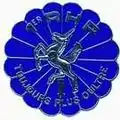 1er Escadron.Toujours plus Oultre
1er Escadron.Toujours plus Oultre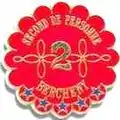 2e Escadron.Second de Personne
2e Escadron.Second de Personne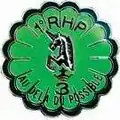 3e Escadron (ERIAC).Au Dela du Possible
3e Escadron (ERIAC).Au Dela du Possible 4e Escadron.Sans Repit
4e Escadron.Sans Repit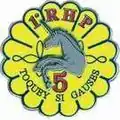 5e Escadron (reserve).Toquey Si Gauses
5e Escadron (reserve).Toquey Si Gauses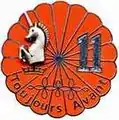 11e Escadron (disbanded on 14 January 2011).Toujours Avant
11e Escadron (disbanded on 14 January 2011).Toujours Avant
Regimental Colors
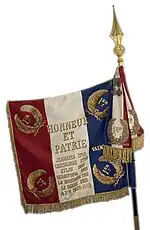

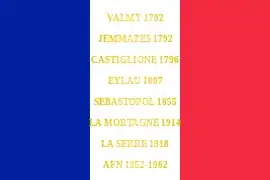 Regimental Colors of the 1st Parachute Hussars Regiment with battle respective honours
Regimental Colors of the 1st Parachute Hussars Regiment with battle respective honours
Regimental Song
Based on the melody of the revolutionary Polish song Whirlwinds of Danger :
- Original version
|
Pour libérer le pays qu'on enchaîne, |
Pour libérer le pays qu'on enchaîne, |
Gyenge violának |
Dienne guen vi o la nack |
Giroflée frêle |
Decorations
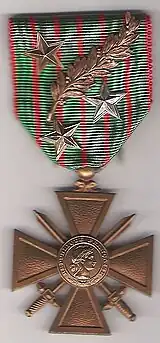 Croix de guerre 1914-1918 with one vermeil star (Citation at the orders of the armed forces).
Croix de guerre 1914-1918 with one vermeil star (Citation at the orders of the armed forces). Croix de guerre 1939-1945 with one palm (citation at the orders of the armed forces).
Croix de guerre 1939-1945 with one palm (citation at the orders of the armed forces). Croix de la Valeur militaire with one palm in 2012 following engagement of the regiment in Afghanistan (Operation Pamir).[1]
Croix de la Valeur militaire with one palm in 2012 following engagement of the regiment in Afghanistan (Operation Pamir).[1]
Battle honours
- Valmy 1792
- Jemmapes 1792
- Castiglione 1796
- Eylau 1807
- Sebastopol 1855
- La Mortagne 1914
- La Serre 1918
- AFN 1952-1962
Regimental Commanders of the 1st Hussars Regiment
Ancien Régime

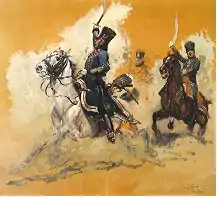

- 1720 : de Bercheny
- 1722 : de Bonnaire
- 1744 : de Nordmann
- 1749 : de Totte
- 1751 : de Bercheny (2), fils du précédent.
- 1762 : de Polleretsky
- 1762 : de Bercheny François Antoine Ladislas (1744-1811), son of the former.
- 1762 : de Sombreuil
- 1771 : de Humbert
- 1776 : de Thumery
- 1785 : de Pange
- 1789 : Henri Roland Lancelot Turpin de Crissé
French Revolution and First French Empire
- 1792 : Henri Christian Michel Stengel-Colonel (**)
- 1792 : Joseph Armand Nordman-Colonel
- 1793 : Philippe Glad-Chef de brigade
- 1795 : Louis Jean Charles Bougon-Duclos-Chef de brigade
- 1796 : Antoine Henri de Carowe-Chef de brigade
- 1797 : Joseph-Denis Picard-Chef de brigade (*)
- 1803 : Philippe Augustin Rouvillois-Colonel
- 1807 : Jacques Begougne de Juniac-Colonel
- 1810 : Eugène Antoine François Merlin-Colonel (*)
- 1813 : François Joseph Marie Clary-Colonel
- 1814 : Nicolas Oudinot-Colonel
- 1815 : François Joseph Marie Clary-Colonel
- Colonels wounded and killed while commanding the 1st Hussars during that period
- colonel Stengel, wounded April 21, 1796 during the battle of Mondovi, died from his wounds on April 28.
- chef de brigade Bouglon-Duclos, died of fever.
- chef de brigade Carrowe killed during the battle of Rovero on September 6, 1796.
- colonel Rouvillois, wounded on December 19, 1806.
- colonel Juniac, wounded on February 6, 1807.
- Officers killed and wounded while serving in the 1st Hussars Regiment between (1805 and 1815)
- Officers killed : 5
- Officers dying from wounds : 6
- Officers wounded : 57
First Restoration et Second Restoration

- État-major du régiment nearing 1815
- colonel Auguste-Ambroise-Joselin de Verdière
- lieutenant-colonel : Armand-Louis, chavalier de l'Orme
- chefs d'escadrons : M. Vidal de Léry et Jacques-Victor de Suzainnecourt
- major : Joseph-Antoine, vicomte de Lodin du Mauvoic
- capitaines adjoint-majors : Pierre de Vigneras et Alexandre Pothée
- lieutenant-trésorier : François Vial
- capitaine d'habillement : Jean-Pierre Carmignac
- sous-lieutenant porte-étendard : Michel-Rémi Renaud
- aumônier : Jean Didier
- chirurgien major : Jean-Baptiste Hermaut
- chirurgien aide-major : Antoine-Claude Marchal, dit Lafontaine
- 1824–1830
- colonel : Ferdinand-Philippe d'Orléans, duc de Chartres, futur duc d'Orléans
1830-1848 : July Monarchy
- 1830–1832 :
- colonel Royal Prince of France, duc d'Orléans
- cieutenant-colonel Lanthonnet
- chef d'escadron de Suremain
- chef d'escadron Lestocquoy
- 1832–1836 : colonel Joseph Simon Pozac
- 1845 : colonel Berryer
Second Empire
- 1854 : colonel comte Lion
- 1856 : colonel Moucheton de Gerbrois
- 1864 : colonel de la Jaille
- 1867 : colonel prince de Bauffremont
1870-1914

- 1870 : colonel prince de Bauffremont
- 1872 : colonel d'Agoult
- 1884 : colonel Poulard
- 1889 : colonel Buffet
- 1892 : colonel Geslin de Bourgogne
- 1894 : colonel Lageon
- 1897 : colonel de Quinemont
- 1907 : colonel Simon de la Mortière
- 1912 : colonel Renaudeau d'Arc

World War I
- 1914 : colonel Leps
- 1914–1918 : colonel d'Amade
Interwar Period
- 1926 : colonel Robert
- 1931 : colonel Aubry de la Noé
- 1932 : colonel Malcor
World War II
- 1939 : colonel Rabany
- 1940 : colonel de Groulard (wounded in 1940, died from injuries sustained in 1947)
From 1945 till present

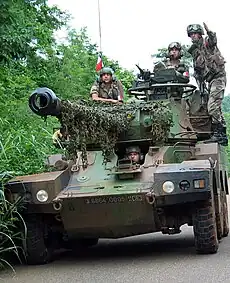
- 1946–19xx : colonel De Gastines
- 1952–1953: colonel Teyssou
- 1954–1956 : colonel Bertrand de Quénetain**
- 1956–1958 : lieutenant-colonel Hebrard
- 1958–1960 : lieutenant-colonel Jean Compagnon
- 1960–1962 : colonel Gautier
- 1962–1963 : lieutenant-colonel Teule
- 1963–1964 : colonel Donnart
- 1964–1966 : colonel de Boifleury**
- 1966–1968 : colonel Laflaquiere
- 1968–1970 : colonel Jean Combette***
- 1970–1972 : colonel Boissau
- 1972–1974 : colonel Delmotte**
- 1974–1976 : colonel Morel
- 1976–1978 : colonel Gouttenoire***
- 1978–1980 : colonel Berge
- 1980–1982 : colonel Varret
- 1982–1984 : colonel Genest
- 1984–1986 : colonel Gobillard****
- 1986–1988 : colonel d'Astorg
- 1988–1990 : colonel Le Mière***
- 1990–1992 : colonel Valentin****
- 1992–1994 : colonel Hubin
- 1994–1996 : colonel Duhesme
- 1996–1998 : colonel Maes*
- 1998–2000 : colonel Duquesne***
- 2000–2002 : colonel de Bavinchove*** ( CEM ISAF in Afghanistan )
- 2002–2004 : colonel Delort-Laval** ( Director of the War School since August 2011 )** division since 2012
- 2004–2006 : colonel de Marisy
- 2006–2008 : colonel de Lapresle*
- 2008–2010 : colonel Villiaumey
- 2010–2012 : colonel Langlade de Montgros
- 2012–2014 : colonel Peltier
- 2014-.... : colonel Aumonier
(*) Officers which subsequently were promoted to Brigade generals.
(**) Officers which subsequently were promoted to Divisional generals
(***)Officers which subsequently were promoted to Corps generals
(****)Officers which subsequently were promoted to Army Generals.
Notable Hussars
- Ferdinand-Philippe d'Orléans, duc de Chartres then duc d'Orléans, Dauphin de France
- César de Vachon de Belmont-Briançon then captain
- Général Jean-Antoine Marbot
- Général Baron Marcellin Marbot
- Général comte Frédéric Henri Walther (from the rank of a regular soldier -private- to the officer rank of captain)
- Général Nicolas-François Christophe (captain in 1793)
- Louis Bro (1781-1844), soldier, then futur cavalry general
- Colonel Nicolas Oudinot, son of Empire Marshal Nicolas-Charles Oudinot
- Maurice Dupin de Francueil, first capitain on December 21, 1805, then chef d'escadron on March 21, 1807
- Général Regnaud de Saint-Jean d'Angély (in 1815, to the rank of captain)
- Charles-Marie-Augustin, comte de Goyon (1803-1870), division general, major at 1er hussards le on January 15, 1839
- Charles Louis Schulmeister
- Charles Théodore Ernest de Hédouville (1809-1890), French politician, served in the regiment after 1829.
- Olivier de Germay
- Gaston de Galliffet
- Lieutenant Robert Chezeau
Gallery
 Embarking of ERC 90 Sagaie of the 1st Parachute Hussars Regiment in a C160.
Embarking of ERC 90 Sagaie of the 1st Parachute Hussars Regiment in a C160. Aérolargage of a VBL of the 1st Parachute Hussars Regiment.
Aérolargage of a VBL of the 1st Parachute Hussars Regiment. Parachute drop on the Ger zone by the 1er RHP.
Parachute drop on the Ger zone by the 1er RHP.
